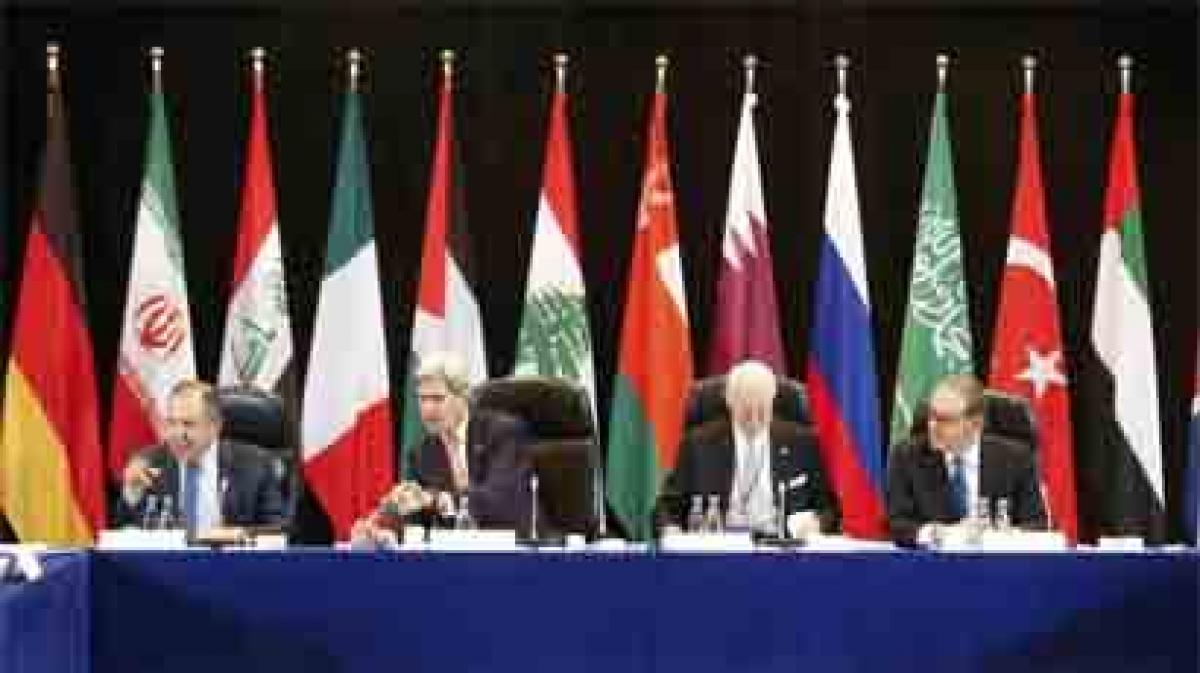Live
- Kadiyam Kavya seeks coach factory at Kazipet
- Gold rates in Hyderabad today slashes, check the rates on 14 December, 2024
- Govt aims at empowerment of women, says Minister Seethakka
- Gold rates in Vijayawada today slashes, check the rates on 14 December, 2024
- Kothagudem: District to play key role in coal production
- Students can achieve greatness through education: Dattatreya
- District-Level Science Exhibition Concludes: 26 projects selected for State-level exhibition
- Atul suicide case: Wife absconds, cops arrest kin
- MP Raghuram demands high-level committee on Polavaram project
- Former KAS officer is successor to Vishva Vokkaliga Mahasamsthana Math
Just In

After an ambitious deal to end hostilities in Syria within a week was signed early Friday, doubts emerged over its viability as it excludes the Islamic State group and Al-Qaeda\'s local branch.
After an ambitious deal to end hostilities in Syria within a week was signed early Friday, doubts emerged over its viability as it excludes the Islamic State group and Al-Qaeda's local branch.
US Secretary of State John Kerry admitted there were "no illusions" about the difficulty of implementing a nationwide "cessation of hostilities" between regime forces and rebels as he announced the deal in Munich alongside Russian Foreign Minister Sergei Lavrov.
The 17-nation International Syria Support Group also agreed that "sustained delivery" of humanitarian aid will begin "immediately", with a new UN task force meeting later Friday in Geneva to start pushing for much greater access to "besieged and hard-to-reach areas".
The deal, struck in late night talks in Munich, went further than expected, with Lavrov talking about "direct contacts between the Russian and US military" on the ground, where the powers are backing opposing sides in the five-year-old conflict.
But after a fortnight in which the forces of Syrian President Bashar al-Assad have besieged the key rebel city of Aleppo with the help of heavy Russian bombing, several nations put the onus on Moscow to implement the Syria deal.
"Through its military action on the side of Assad's regime, Russia had recently seriously compromised the political process. Now there is a chance to save this process," foreign ministry spokeswoman Christiane Wirzt said.
"What is important now is embracing this opportunity, stopping the airstrikes, ceasing targeting civilians and providing humanitarian access," added Turkish Foreign Minister Mevlut Cavusoglu on Twitter.
Huge question marks
Analysts remained sceptical about the chances of ending the bloodshed.
"(The agreement) is ambitious and yet very tenuous... there are huge question marks," said Julien Barnes-Dacey, of the European Council on Foreign Relations.
The failure to include Al-Qaeda affiliate Al-Nusra in the cessation of hostilities was particularly important, he said, since the group is active in Aleppo and surrounding regions, and many of the more "moderate" rebels have links with it.
"In many ways this Munich meeting was thrust to the fore by the situation in Aleppo, and yet the conditions of the agreement do not seem to apply to Aleppo," said Barnes-Dacey.
"Talking about Nusra works in the Russians' favour since so many rebel groups have ties to Nusra. This effectively gives the green light for the Syrian government and its allies to carry on military action while paying lip service to the agreement."
Lavrov underlined that "terrorist organisations" such as IS and Al-Nusra "do not fall under the truce, and we and the US-led coalition will keep fighting these structures".
But other analysts struck an optimistic note, saying it was significant that the US and Russia had been able to strike a deal at all.
"It almost reminds one of superpower agreements in the days of the Cold War," said Michael Williams, a former UN diplomat in Lebanon at London's Chatham House think tank.
The US and Russia have "taken ownership of this now. This is important. The parties, the opponents will notice this. It will put quite a bit of pressure on Assad and his regime. It's very hard for them now to walk away."
Words on paper
Peace talks collapsed earlier this month over the offensive on Aleppo, which has forced at least 50,000 people to flee, left the opposition virtually encircled and killed an estimated 500 people since it began on February 1, the latest hellish twist in a war that has claimed more than a quarter-million lives.
A key Syrian opposition body, the High Negotiations Committee, said Friday it was up to rebels on the ground whether to implement the deal.
Kerry said talks between rebels and the regime would resume as soon as possible, but warned that "what we have here are words on paper, what we need to see in the next few days are actions on the ground."
A UN task force, co-chaired by Russia and the US, will work over the coming week "to develop the modalities for a long-term, comprehensive and durable cessation of violence," Kerry said.
The separate aid task force will pressure the Syrian government to open routes, since only around a dozen of 116 UN access requests have been granted.
Russia and the West remain starkly at odds on several issues, particularly Moscow's failure to focus its bombing on the Islamic State group.
"So far Russia has mainly targeted opposition groups and not ISIL and intense air strikes against different opposition groups in Syria have actually undermined efforts to reach a negotiated peaceful resolution," said NATO chief Jens Stoltenberg, speaking at the Munich Security Conference on Friday.
"We need a lasting ceasefire, we need help to the civilians, we need a political negotiated solution," he said.

© 2024 Hyderabad Media House Limited/The Hans India. All rights reserved. Powered by hocalwire.com







